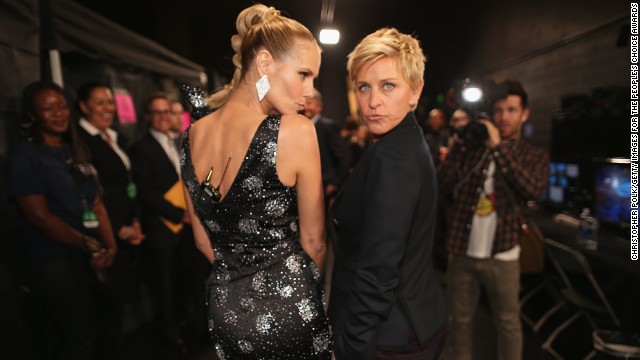Dancing With the Stars Elimination: Drew Carey or Candace Cameron Bure—Who Went Home? Plus, Another Perfect Score
Though it was "Party Anthem Night" on Dancing With the Stars, the April 21 outing was anything but fun for one celeb as they were eliminated from the competition. Party rocking with the judges tonight? LMFAO frontman Redfoo, who served as the night's guest judge.
The two stars who found themselves in the bottom three by the two-hour fiesta's end were The Wonder Years star Danica McKellar, Full House alum Candace Cameron Bure (How rude!) and The Price Is Right host Drew Carey and in the end, Drew and his professional partner Cheryl Burke were ousted from the ballroom.
On a brighter note, Maksim Chmerkovskiy finally had a reason to smile as he finally scored a 10 from head judge Len Goodman for his dance with Meryl Davis, which landed them a perfect 40. Goodman gushed that Davis, the Olympic ice dancer, is the first celeb that has been "able to keep up with" Maks, while Carrie Ann Inaba called the pair "magical."
Here is a rundown of the night's performances and scores:
Meryl Davis and Maksim Chmerkovskiy: 40 points for their tango to "I Feel So Close to You Right Now"
Amy Purdy and Derek Hough: 38 points for their jive to "Shout"
Danica McKellar and Val Chmerkovskiy: 36 points for their cha-cha-cha to "I Wanna Dance With Somebody"
Charlie White and Sharna Burgess: 36 points for their cha-cha-cha to "Everybody Dance Now"
James Maslow and Peta Murgatroyd: 35 points for their quickstep to "You're the One That I Want"
NeNe Leakes and Tony Dovolani: 33 points for their salsa to "Hot in Here"
Candace Cameron Bure and Mark Ballas: 32 points for their cha-cha-cha to "I Love It"
Drew Carey and Cheryl Burke: 32 points for their tango to "Super Freak" (eliminated)
Do you think Drew should've been eliminated? Sound off in the comments!





Neil Patrick Harris Curses at Fan During Hedwig and the Angry Inch Broadway Performance
According to Page Six, after a female admirer yelled out "I love you Neil!," during the show Saturday, Harris shot back, "I'm doing something up here, motherf—cker!"
The former How I Met Your Mother star isn't denying that this happened, but he is saying the supposed curse out was taken out of context, tweeting "It seems my Hedwig improvs are making news, but one should have the full story/context."

He pointed fans to a Gossip Cop story which said he didn't curse out a fan during his performance, his character did, adding that the "musical—about a transgender German rocker—is highly improvisational, embracing audience interaction."

"Harris and his cast mate were able to turn the fan's well-meaning comment into a entertaining addition to the show," the site continued.
Harris' rep elaborated on this, telling E! News, "When the fan initially yelled, ‘I love you, Neil,' Neil then responded, ‘Who's Neil? I'm not Neil.' He then looked at Yitzhak and said, ‘Are you Neil? You better not be Neil' followed by Hedwig then offering the quote published in Page 6."
When talking about his upcoming role in the production, Harris told Out magazine, "Hedwig is bringing up a lot of super insecure things within me. I have never thought drag was intoxicating, I've never had a fun drunken Halloween in drag, never been in heels, really. I've lived my whole life being attracted by masculinity—it's why I like guys. I'm not a super effete person, and I have to turn into that, and in doing so it brings up a lot of homophobic insecurities within myself."
The musical is currently in the middle of previews with the opening night April 22.
-Additional reporting by Marcus Mulick
'Supernatural' star Jensen Ackles on forgiveness, the internal effects of the Mark of Cain: 'Dean's putting on blinders and taking steroids'
Last we saw of the handsome Winchester brothers, things were … complicated. Let’s just say that Supernatural‘s ninth season is full of battles: Sam’s inner battle, Dean’s inner battle, the brothers’ battle with each other, the battle in hell, and the brewing battle in heaven, to name a few. So as we head into the end of the season, what can we expect from our favorite hunters, their angelic sidekick, and a blood-addicted demon?
For starters, Tuesday night’s episode focuses around the search for The First Blade, aka the weapon that pairs with the Mark of Cain to kill Abaddon. But do we want Dean to find the blade considering we’re yet to see the consequences we know come with the Mark of Cain? We’re not so sure, which is why we caught up with Jensen Ackles to talk about the end of the season, Dean’s dilemma, and all things pertaining to that pesky (but kind of badass) Mark of Cain:
ENTERTAINMENT WEEKLY: This season has so much going on, with bigger stuff in heaven and hell, and somehow Sam and Dean still finding time to work smaller cases. From here on out, is it still this mix of heaven and hell sprinkled with smaller cases, or are we getting back to the bigger dilemmas and dropping the episodic stuff?
JENSEN ACKLES: As we start to near the end of the season, all of the big storylines start to culminate and start to intertwine a little bit more. The climax is building, so to speak. So yes, we are going to start to get back into those storylines. They are going to start lining up with one another, so the heaven and hell is going to directly affect whatever happens with Abaddon, the First Blade obviously being a key to unlock that problem, and then it will snowball, domino effect – however you want to put it – it’s all going to start to come to a head here pretty soon.
GET MORE EW: Subscribe to the magazine for only 33¢ an issue!
We know that the Mark of Cain comes with a “burden” and a
“cost,” but we’ve yet to see it in action. So where is this going to
take Dean? The last time something was on somebody’s arm it was Sam and
he was about to die.[Laughs] Yeah, we’re always about to die at some point. There’s always something creeping up on one of the brothers, but this particular thing, it’s more of an internal thing, much like Sam’s issues. It’s something that’s happening inside. I think Dean’s becoming less compassionate. He’s becoming a little bit more primal in his dealings with good and bad. He’s becoming a little bit more tunnel vision, and he’s getting really really amped up very quickly. You might want to say it’s almost like Dean’s putting on blinders and taking steroids. So it’s a dangerous combo.
Like in the last episode, Dean seemed to kill a guy pretty easily…
Yes, so therein lies a bit of the issue that Dean’s struggling with. Normally, he might just chain the guy to a pipe because he’s not an actual monster, he’s a real guy, or turn him over to the authorities or let real people handle real people. He’s not in the business to do that; he’s in the business of hunting and killing monsters. So that being said, because of what this mark is doing to him and his judgment and his moral compass, it’s a little askew. He doesn’t have a problem with offing anybody that stands in his way, anybody that’s doing bad. He’s become very cut and dry, and cut and dry doesn’t necessarily mean right and wrong. It’s a tricky line, and he’s having a little trouble navigating it, I think.
The last episode also had this great parallel with Ed and Harry and Sam and Dean, which ended with the realization that some things can’t be forgiven. Can Dean be forgiven at this point?
I don’t know. And that’s something that he’s been struggling with all season is what he decided to do for Sam at the beginning of the season, which was trick Sam into allowing this angel to occupy his body. Obviously, Dean was tricked as well, which spun the whole thing. In fact, I kind of joked with Jared [Padalecki], I think [that] episode 10 this season was actually the first time that we saw the real Sam, because all nine episodes leading up to that it was somebody else speaking for Sam, so that’s been a real jagged pill for Dean to swallow. He’s having a real hard time with that obviously. You saw, he kind of went on his own and [it] didn’t really matter who he worked with, i.e. Crowley, to get some revenge or to try to right some wrongs or to try to do something that gives him a sense of purpose or a sense of right. In doing so, he invited the Mark of Cain and now that’s kind of sent him into a bit of a tailspin. Whether or not Sam is able to forgive and forget is to be seen. I’m not sure that Dean is counting on it, which is another log on the fire of his dilemma of everything else is just kind of a means to an end.
Are you crying in every episode? Not that I’m against it, but I feel so bad for Dean this year.
[Laughs] Yeah, he’s definitely … although I don’t necessarily know that there have been tears shed but there’s definitely the emotional aspect of sniffle, sniffle, which can be a bit of “cue the eye roll” kind of thing. Yeah it’s been kind of a tough season for Dean, and it’s been a tough season for me having to play Dean, because a lot of times Dean has a lot comic one-liners. Dean doesn’t take himself too seriously, and he can joke around and he can use that devil-may-care attitude, and this season, not so much. It’s been a pretty big burden that he’s had to carry this year, and it’s taken its toll on him. He’s not real thrilled about his life, and whether or not that’s going to result in something devastating, I don’t know. Right now, it’s pretty bleak in Dean world.
I’m also looking forward to digging further into the Men of Letters Lore. This next episode introduces another member, does it not?
It does. Yeah we dive a little deeper into that; we peel another layer of the onion back from the history behind the Men of Letters. I thought that when they first introduced that, it was such a smart way to unveil a whole new world to these guys, a world that they thought they knew a lot about, but obviously there’s so much more to learn. I still think that we have that as a possibility. This next episode, I don’t necessarily think that there’s some massive big discovery, but it does shed a little bit more light on what it was and what it could potentially be for the brothers. But like we were just talking about, the brothers have some issues that they’ve gotta deal with first before they can start grave digging and history hunting.
We’ve been getting a lot of throwbacks recently, a few familiar faces. Will we see any more familiar faces by end of the season?
If we are, they don’t tell me, because they know I’ll tell you. I have a big mouth when it comes to that stuff, because I get really excited about it. I would say I hope so. I think that it’s been well-received by the fans, and I think also people enjoy coming to work on the show. I get phone calls and text messages and emails from a lot of different people who have A) Either worked on the show before or B) Want to work on the show, and they’re always like, “Hey when are you going to get me on the show?” And I’m like, “Hey, it’s not in my hands.” It’s up to the writers and whether it fits the storyline and will work and that’s great. I do know that it’s worked really well for us, and I hope we continue to see faces from the past and also really interesting new faces.
You can tell them Samantha would like some more Lucifer.
Yeah, absolutely. The problem is we have such good actors come on our show that we can’t keep them around because everybody else wants them, so they go off and do other shows.
'The Americans': Noah Emmerich on Stan's 'dark and difficult' season 2 journey
You would think that as an FBI agent, Noah Emmerich’s Stan Beeman would have it a little easier than most of the characters on FX’s hit spy drama — but not so much. Last season, he became involved with Russian informant Nina Sergeevna (Annet Mahendru), who turned out to be a double agent of sorts. And as we saw from his reactions in Wednesday night’s episode, “New Car,” his personal and professional life are pretty close to disintegrating completely. “It’s sort of a painful place that we find him in,” Emmerich admits, speaking about his character’s journey so far in season
2. “He’s struggling.”
EW spoke with Emmerich about how Stan is adapting to his painful struggle, how his relationship with Nina has affected him, and what he thinks is in store for Stan as we head into the home stretch of the season.ENTERTAINMENT WEEKLY: First of all, congratulations on season 3! I’m so excited for you guys, which means my first question is going to be about if you know where Stan is headed…or if you know how far your character has been mapped out at this point.
NOAH EMMERICH: I’m not sure where they are in the mapping, but I certainly don’t. I’m not sure if they know themselves, actually. I think it’s still yet to be determined. I’m hoping for a little more sunlight.
GET EW ON YOUR TABLET: Subscribe today and get instant access!
And less depressing storylines? I’m not sure that’s possible on this show…[laughs] It seems to be inherent of its nature.
Last season, Stan’s relationship with Nina became kind of a through line, and this season it’s become an even bigger part of his character journey. How has this relationship changed Stan as a person?
I think on some level, Nina has reminded him of himself at an earlier stage in his career. I think that coming out of the three years undercover and relocating to Washington, D.C. and the new counterintelligence division, we find him in the beginning of season 1 somewhat post-traumatic-stress disordered out, somewhat in shock, somewhat estranged from his family and from himself. Clearly, his first engagement with Nina is to turn her into a source and a tool for his job, to unravel the Soviet mystery and get inside enemy lines. But I think that evolves rather quickly into empathy and compassion for her. And maybe in some Freudian sense, he’s trying to save himself as he develops feelings for her and trying to save her and trying to excavate her from the wrath in which she’s entangled. I do feel like it’s a complicated dynamic. But I think he feels very empathic and sympathetic and hopeful that he’ll be able to, on some level, save her from some of the scars and bruises he’s endured in his own career. Of course, ironically enough, it turns out by the end of season 1 that she’s in fact manipulating him as well…but he obviously remains oblivious to that reality.
I feel like this season, we’ve really seen Stan become more transparent. He’s lost a lot at this point, a lot of things are chipping away at him, and we’re seeing what happens as he becomes more unraveled – and we know what happens when he loses it. But I think there’s a lot to be said in Nina bringing out that emotional vulnerability in him.
From some point of view, Nina is all he’s got right now. He lost his partner last season, he’s deeply estranged from his family, even his colleagues at work — his boss, Agent Gaad, has harbored some sort of ill will and resentment to the sort of the pickle that Stan has put the Bureau in with Vlad’s murder. So he’s evermore sort of alone and isolated and the only real tether that he has at this point, the only continual connection and through line he has, is via Nina. And along comes this new character, Oleg, who seems to be nosing around and knows too much about Nina and knows too much about Stan and Nina, so there’s a real threat to the one surviving connection that he has in this job. And I think that sort of raises the stakes and pressure and feelings of isolation that Stan is going through.
As a viewer, it’s so fun to watch the mind games between this new “threesome” of Stan and Oleg and Nina. Stan is trying to stay one step ahead and double-cross the people who are also double crossing him, it seems he’s already kind of compromised.
Yeah, it seems hard to imagine that something’s not going to explode. There’s too much tension and too much emotion in the stew, and something’s gotta give. The question is where and how it happens, if in fact it does. It seems hard to imagine it will have a happy ending.
I find Stan to be such a fascinating character. So many people see him as a bad guy, but I think he’s the one person on the show that is actually a really good guy who just gets caught up in this darkness in the wrong way. From an actor perspective, is that how you see him, also?
I see Stan as a thoroughly good person. I see Stan as someone who has dedicated his life to serving a cause greater than himself at great personal expense, he’s committed to serving his country and to protecting the security of his country, and he’s in this terrible Cold War. He’s a part of this, as are Philip and Elizabeth. I think they’re good people, and doing what they think of as patriotic and noble and in service of a cause that is bigger than themselves. They’re certainly not leading selfish lives, any of these characters…they’re all dedicated to things outside their own personal gain. And the circumstances and context of the Cold War demands very questionable actions, but those decisions are made by people higher up than these characters. They’re sort of, in a way, servants of the Cold War, so it does cause incredible personal compromise and impeachment of their own moral personal integrity. But in many ways, their lives aren’t in their own hands – they’re on the front line. So I don’t think Stan is a bad person at all. I think he’s trying to be as noble and moral and patriotic as he can be, and you go down the rabbit hole of this time in the world and you’re forced to confront all sorts of demons and compromises to perhaps what may be your own personal outlook on life, or desire to be an upstanding citizen.
Given how complicated Stan has become, what are some of the challenges you’ve found between season 1 and now with playing him?
Well, season 1…as painful and difficult as it was for Stan, it was certainly an easier season. Things go badly for Stan at the end of the season 1 when we see Nina’s betrayal of that relationship, and this year, they’ve only gotten worse. So as dark as difficult as it was, I feel like it’s even more dark and difficult. He’s more isolated, he’s less on top of his game. Last year, he got really close to catching Philip and Elizabeth and he seemed to be hot on their trail. This year, he’s not as close to them, he’s not as close to solving the mystery, and he’s being manipulated by forces he’s not even aware of. And yet he’s doubly committed and dedicated to trying to execute his job successfully.
In last night’s episode, there were some great moments between Stan and Philip – it was a nice reminder of the fact that this relationship is still something that’s important, given everything else that’s been going on this season.
I think there’s a lot of room for an interesting relationship to evolve. It hasn’t gotten a tremendous amount of airtime this season thus far, but I think this friendship outside of the true relationship that Stan is oblivious of — in terms of knowing who Philip really is — I think there’s a simpatico dynamic between them. There’s obviously some resonance and some attraction to each other, and I think that’s a really interesting relationship to explore. Hopefully we’ll have a chance to do that much more as the series progresses.
Philip and Stan are more similar than anyone realizes, both hiding secrets and technically playing each other. As a viewe
r, it’s so fun to watch that interaction and pick up on that conflict.
It’s almost like they’re two sides of the same coin. They’re opposite sides, they’re really cut from the same material, they’re reflections of each other to some extent. They have so much overlap in their work and in their lives. Certainly, unbeknownst to Stan, Philip is aware of it, and then how much Stan knows or doesn’t know or suspects or doesn’t suspect, we’re not really 100 percent sure of. I think there’s some intuition and sense that they come from somewhere similar, and there’s some deeper sense of mutual understanding than would be expected normally in that relationship. And I think its quite fun for the audience. Obviously, the audience knows everything, so watching these two characters can be really fun.
Is there anything you can tease about what’s coming up for Stan as we head into the end of the season?
I would just sort of say that everything is coming together into some sort of necessary breaking point. It can’t be sustained, what’s happening, as we discussed. It’s going to come to some sort of climax or conclusion or eruption or disaster or evolution…we don’t know how, but it clearly can’t stay. We have more than two trains headed for the same spot, so something’s gotta give. Something’s gonna blow up – that seems inevitable. Hopefully, the curiosity of what that is is compelling and intriguing for the audience. Stay tuned…that’s all I can say.
The Late Stephen Colbert
One’s first reaction to the ascension—or descent—of Stephen Colbert to the helm of the CBS program soon to be formerly known as “Late Show with David Letterman” is grief: uncomprehending, possibly inconsolable grief. Why? Because, according to more than one news bulletin, the move means “the end of the character Colbert made famous on ‘The Colbert Report.’ ”
What? What? How can that be? What does that even mean?
We, his fans, have always understood, in a
vague sort of way, that there exists a regular human being whose Social
Security card identifies him as Stephen Colbert—a nice fellow with a
nice family and a nice house in a nice New Jersey suburb. On television,
though, there is no such person. There is only The Character.
For eight years—for every minute of every half-hour of every edition of “The Colbert Report”—“Stephen Colbert” has been the exuberantly prim, indefatigably dim, supremely confident faux-conservative pundit who, brandishing a rippling, man-size American flag, has swooped thrillingly down at us four nights a week. Soon he will be gone. And we, his fans, will be bereft, deprived of the consolations he offers us for, among other afflictions, the existence of Fox News.
One’s second reaction is a question. Why Colbert? Why not the other guy?
After all, it is much easier to imagine a smooth transition from “The Daily Show with Jon Stewart” to “Late Show with Jon Stewart.” (For some reason, CBS insists on omitting the “The.”) I mean no disrespect to Stewart’s undoubted genius when I say that he and his program hew to the standard late-night formula more closely than do Colbert and his. On “The Daily Show,” Stewart does not play someone else. He is by all accounts the same person on camera as off. His opening riffs are delivered sitting down rather than standing up, and he uses video clips to sharpen his points, but they are formally similar to (though far more acute than) the monologues delivered by Letterman and Leno and the rest, all the way back to Carson and Paar and Steve Allen.
All three shows—“Colbert,” “Daily,” “Late”—share certain elements: a warmed-up, hopped-up studio audience; the host’s opening remarks; the host’s interview with “my guest[s] tonight.” There is some overlap between the type of guests welcomed on “Colbert” and “Daily” and those one finds on “Late Show” and its ilk, though obviously the ratio of public-affairs substance to show-biz glitz declines as one moves from left, so to speak, to right. You’re not likely to find Miley Cyrus on the former or David Cay Johnston on the latter, but a Michael Lewis or a George Clooney is equally welcome on both.
If Colbert’s interviews—meta-interviews, really—tend to be a little edgier, a little more unpredictable, than either Stewart’s or Letterman’s, one can’t help assuming that it’s because they are conducted by The Character, not the everyday husband and father. What will happen when the interviewer is Stephen Colbert, not “Stephen Colbert”? If an E! Online compilation of Colbert-as-Colbert is any guide, he’ll be charming, intelligent, and amusing. But the hint of lethality, if not altogether gone, is likely to be attenuated. The Character hasn’t had to worry about being likeable, any more than Elmer Fudd did. He’s been free to go places that an actual person can’t. The Character’s very one-dimensionality has given his interviews an interestingly three-dimensional quality.
There’s no disputing Colbert’s talent and energy, and of course he is within his rights to want to try new things after fifteen years (counting his “Daily Show” apprenticeship under Stewart) of one thing. As for Stewart, there’s been no indication that he even wanted the job, whereas Colbert is said to have pursued it assiduously. The million-dollar-a-month salary might have been a factor, too. It certainly would be for The Character, who mock-loved the ideology of the Free Market more than life itself.
An unfortunate atmosphere of reverence surrounds these legacy late-night TV jobs, as if Carson, Letterman, Paar and the rest were Popes, or even saints. The shows are encrusted with tradition and ritual. Compared to what Stewart and Colbert have wrought on Comedy Central, the offerings on the old three-letter networks, no matter how many Jimmys they’re fronted by, feel tired.
Stewart will now have to soldier on alone. The immediate loss is for liberals, for whom “Stephen Colbert” has played a unique role as a fifth column. The Character has been a miraculous and unparalleled intellectual and political achievement, sustained for a very long time at a very high level. But if the intelligence, discipline, and hard work that Colbert invested in The Character can be brought to bear on revitalizing the variety show, then the polity’s loss may turn out to be the culture’s gain. If Colbert can truly reinvent the genre, if he has the freedom and the inclination to blow it up and build on the rubble, then perhaps The Character will not have died in vain. For the moment, though, excuse me while I put on my black armband.
Photograph by Lloyd Bishop/NBC/NBCU Photo Bank/Getty.
For eight years—for every minute of every half-hour of every edition of “The Colbert Report”—“Stephen Colbert” has been the exuberantly prim, indefatigably dim, supremely confident faux-conservative pundit who, brandishing a rippling, man-size American flag, has swooped thrillingly down at us four nights a week. Soon he will be gone. And we, his fans, will be bereft, deprived of the consolations he offers us for, among other afflictions, the existence of Fox News.
One’s second reaction is a question. Why Colbert? Why not the other guy?
After all, it is much easier to imagine a smooth transition from “The Daily Show with Jon Stewart” to “Late Show with Jon Stewart.” (For some reason, CBS insists on omitting the “The.”) I mean no disrespect to Stewart’s undoubted genius when I say that he and his program hew to the standard late-night formula more closely than do Colbert and his. On “The Daily Show,” Stewart does not play someone else. He is by all accounts the same person on camera as off. His opening riffs are delivered sitting down rather than standing up, and he uses video clips to sharpen his points, but they are formally similar to (though far more acute than) the monologues delivered by Letterman and Leno and the rest, all the way back to Carson and Paar and Steve Allen.
All three shows—“Colbert,” “Daily,” “Late”—share certain elements: a warmed-up, hopped-up studio audience; the host’s opening remarks; the host’s interview with “my guest[s] tonight.” There is some overlap between the type of guests welcomed on “Colbert” and “Daily” and those one finds on “Late Show” and its ilk, though obviously the ratio of public-affairs substance to show-biz glitz declines as one moves from left, so to speak, to right. You’re not likely to find Miley Cyrus on the former or David Cay Johnston on the latter, but a Michael Lewis or a George Clooney is equally welcome on both.
If Colbert’s interviews—meta-interviews, really—tend to be a little edgier, a little more unpredictable, than either Stewart’s or Letterman’s, one can’t help assuming that it’s because they are conducted by The Character, not the everyday husband and father. What will happen when the interviewer is Stephen Colbert, not “Stephen Colbert”? If an E! Online compilation of Colbert-as-Colbert is any guide, he’ll be charming, intelligent, and amusing. But the hint of lethality, if not altogether gone, is likely to be attenuated. The Character hasn’t had to worry about being likeable, any more than Elmer Fudd did. He’s been free to go places that an actual person can’t. The Character’s very one-dimensionality has given his interviews an interestingly three-dimensional quality.
There’s no disputing Colbert’s talent and energy, and of course he is within his rights to want to try new things after fifteen years (counting his “Daily Show” apprenticeship under Stewart) of one thing. As for Stewart, there’s been no indication that he even wanted the job, whereas Colbert is said to have pursued it assiduously. The million-dollar-a-month salary might have been a factor, too. It certainly would be for The Character, who mock-loved the ideology of the Free Market more than life itself.
An unfortunate atmosphere of reverence surrounds these legacy late-night TV jobs, as if Carson, Letterman, Paar and the rest were Popes, or even saints. The shows are encrusted with tradition and ritual. Compared to what Stewart and Colbert have wrought on Comedy Central, the offerings on the old three-letter networks, no matter how many Jimmys they’re fronted by, feel tired.
Stewart will now have to soldier on alone. The immediate loss is for liberals, for whom “Stephen Colbert” has played a unique role as a fifth column. The Character has been a miraculous and unparalleled intellectual and political achievement, sustained for a very long time at a very high level. But if the intelligence, discipline, and hard work that Colbert invested in The Character can be brought to bear on revitalizing the variety show, then the polity’s loss may turn out to be the culture’s gain. If Colbert can truly reinvent the genre, if he has the freedom and the inclination to blow it up and build on the rubble, then perhaps The Character will not have died in vain. For the moment, though, excuse me while I put on my black armband.
Photograph by Lloyd Bishop/NBC/NBCU Photo Bank/Getty.
The Theatre
Dress-Up
Style in three new stagings.
by Hilton Als
Style, when it works, can be a startling and
pleasurable thing. But the American response to it is often complicated.
It’s not unusual for one’s fellow-citizens to resist imaginatively
decorated people, environments, or cuisines: falling for such manicured
charm, they fear, would be a sign of shallowness. While style is,
generally speaking, about surfaces, there can be something deep, moral,
and anarchic about it, too. I think Kennedy Fraser was right when she
remarked, in this magazine, in 1973, that a “touch of outrageousness”
can be “a moral obligation.” And that’s because style is the enemy of
middle-of-the-road thinking—of what Fraser called “meanness,
calculation, petty-mindedness, and the base fear of going out on a
limb.” Sussing out real style in American theatre today requires one to
go out on a kind of limb, avidly searching for shows that are more than
just a series of producers’ calculations.
Truman Capote, a grand stylist himself, argued that “high style has
never been a forte of the Western theatre,” but he must not have been
thinking of theatre artists like Bertolt Brecht and Kurt Weill, whose
incredible first collaboration, “The Threepenny Opera” (1928), is an
exercise in nasty style. Its creators, drawing on the energy they found
in the trashy newspaper stories they read, the myths they heard about
America, the foul-smelling tango palaces they visited, put together a
collage, whose glue was the cynicism that informed life in Berlin, as
Germany slid into the Great Depression. Set partly in London’s
Soho—Brecht had never been to England when he and Weill started work on
the piece, but he liked to invent things about real places—the show
opens at a fair, where, Brecht says, “the beggars are begging, the
thieves are stealing, the whores are whoring.” In the director and
choreographer Martha Clarke’s new staging (an Atlantic Theatre Company
production, at the Linda Gross), Mr. Peachum (F. Murray Abraham), who
runs a sort of school and way station for thieves and
panhandlers—“Threepenny” is based on John Gay’s “The Beggar’s
Opera”—tells us a bit about the world we’re entering as he pulls back
the heavy curtain, like an illusionist in love not with fantasyThe Greatest Documentaries of All Time
So, first, my list:
“Shoah” defines the very possibility of a film about the Holocaust; “Histoire(s) du Cinéma” fulfills the idea of the great movie archive (fiction and documentary alike) as the imprint of its time; “Portrait of Jason,” the portrait-film that’s a self-definition in real time; “The Children Were Watching,” the implication of filmmakers in the self-revealing performance of its subjects (cf. “The Unknown Known”); “Night and Fog,” the cinematic X-ray of history in present-tense events; “Numéro Zéro,” family history; “Strange Victory,” political psychoanalysis to reveal trauma and trouble in daily life; “The Emperor’s Naked Army Marches On,” confronting a country’s past crimes through personal confrontation; “Welfare,” uncovering and analyzing the structures of institutions at work in events at hand.
What these selections have in common is the idea of history, the construction of history cinematically, and the manifest personal involvement of the filmmakers in that construction. The ultimate subject of all great documentaries is the presence of the filmmaker at the events on view or under consideration—and when, as in Wiseman’s work, the filmmaker is subtracted, it’s a conspicuous subtraction, as if by way of an onscreen equation. The implication of the past in the present, the ongoing effect of the past in the present, is another crucial documentary idea—the contextualization of reported events by means of visual archeology and intellectual analysis, the unfurling of the filmmakers’ own thought process by way of that analysis. That’s the source of these ten movies’ vital, dynamic, and ongoing inspirations for other filmmakers, as well as for these filmmakers’ own later works. The past in the present, the future in the present—the essence of the great documentary is in the cinematic conception of time, the disjunction between the real time of filming and the times that it implies. Rule of thumb: the greater and more wondrous that disproportion, the greater the film.
“Shoah” (1985, Claude Lanzmann)I’m the first to admit that it’s a somewhat tendentious list, with an odd preponderance of French movies. This isn’t merely the result of a personal affinity for an adoptive cinematic homeland but, rather, the crystallization of an idea (one that I hinted at here last week): the history of documentary filmmaking isn’t the fact of capturing events on the wing but the idea of doing so, not the invention of investigative recording but its reinvention. That’s why, for this list, I selected movies that open new vistas for documentary filmmaking, which imply vectors of activity and thought that are still being realized today by the era’s best documentarists—and why, in mentioning these films, each of them implies many others that they have inspired.
“Histoire(s) du Cinéma” (1988-98, Jean-Luc Godard)
“Portrait of Jason” (1967, Shirley Clarke)
“The Children Were Watching” (1961, Robert Drew)
“Chronicle of a Summer” (1960, Jean Rouch and Edgar Morin)
“Night and Fog” (1955, Alain Resnais)
“Numéro Zéro” (1971, Jean Eustache)
“Strange Victory” (1948, Leo Hurwitz)
“The Emperor’s Naked Army Marches On” (1987, Kazuo Hara)
“Welfare” (1975, Frederick Wiseman)
“Shoah” defines the very possibility of a film about the Holocaust; “Histoire(s) du Cinéma” fulfills the idea of the great movie archive (fiction and documentary alike) as the imprint of its time; “Portrait of Jason,” the portrait-film that’s a self-definition in real time; “The Children Were Watching,” the implication of filmmakers in the self-revealing performance of its subjects (cf. “The Unknown Known”); “Night and Fog,” the cinematic X-ray of history in present-tense events; “Numéro Zéro,” family history; “Strange Victory,” political psychoanalysis to reveal trauma and trouble in daily life; “The Emperor’s Naked Army Marches On,” confronting a country’s past crimes through personal confrontation; “Welfare,” uncovering and analyzing the structures of institutions at work in events at hand.
What these selections have in common is the idea of history, the construction of history cinematically, and the manifest personal involvement of the filmmakers in that construction. The ultimate subject of all great documentaries is the presence of the filmmaker at the events on view or under consideration—and when, as in Wiseman’s work, the filmmaker is subtracted, it’s a conspicuous subtraction, as if by way of an onscreen equation. The implication of the past in the present, the ongoing effect of the past in the present, is another crucial documentary idea—the contextualization of reported events by means of visual archeology and intellectual analysis, the unfurling of the filmmakers’ own thought process by way of that analysis. That’s the source of these ten movies’ vital, dynamic, and ongoing inspirations for other filmmakers, as well as for these filmmakers’ own later works. The past in the present, the future in the present—the essence of the great documentary is in the cinematic conception of time, the disjunction between the real time of filming and the times that it implies. Rule of thumb: the greater and more wondrous that disproportion, the greater the film.
Roseanne Barr sheds pounds, thanks fans
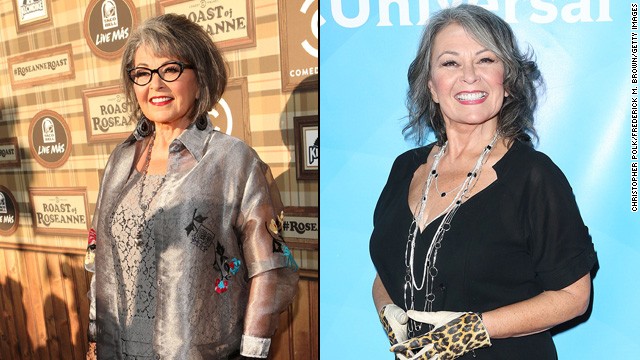 There is less of Roseanne Barr to love these days.
There is less of Roseanne Barr to love these days.
Barr showed off her new
svelte figure Tuesday at the NBCUniversal Summer Press Day. The comedic
actress was there as part of her new gig as a judge on the network's
show "Last Comic Standing."
Fans praised Barr for her
new look and she responded by tweeting "hey, THANK YOU GUYS SO MUCH FOR
ALL OF THE NICE WORDS ABOUT MY WEIGHT LOSS! I'm inspired 2 keep going!"
Roseanne Barr recently showed off a slimmer figure at the 2014 NBCUniversal Summer Press Day in Pasadena, California. The 61-year old has been delighted by all the attention fans have paid to her new figure and thanked them via Twitter :
"hey, THANK YOU GUYS SO MUCH FOR ALL OF THE NICE WORDS ABOUT MY WEIGHT LOSS! I'm inspired 2 keep going! "
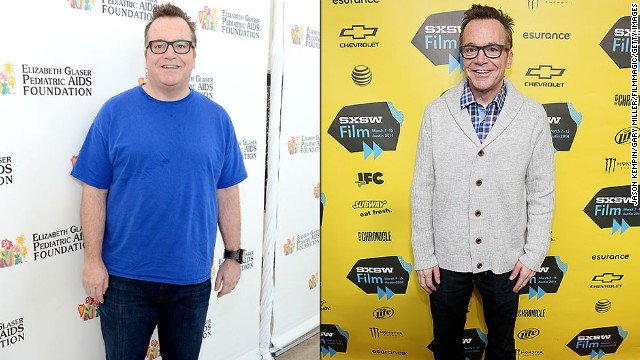 Tom Arnold has lost
about 90 pounds since his first child was born last year, and he was
looking quite thin at this year's South by Southwest festival, left.
He'd actually lost the same amount of weight before but regained it when
he didn't maintain healthier habits. After his son was born, he knew he
needed to make a lasting change. "I saw that little baby and I thought,
'I gotta stay alive for as long as possible,' " Arnold said in January.
"That's a lifelong commitment."
Tom Arnold has lost
about 90 pounds since his first child was born last year, and he was
looking quite thin at this year's South by Southwest festival, left.
He'd actually lost the same amount of weight before but regained it when
he didn't maintain healthier habits. After his son was born, he knew he
needed to make a lasting change. "I saw that little baby and I thought,
'I gotta stay alive for as long as possible,' " Arnold said in January.
"That's a lifelong commitment." 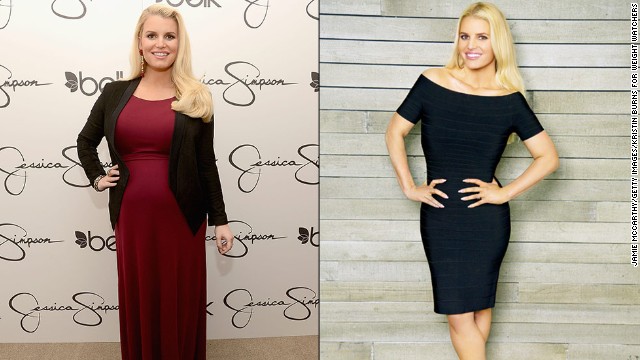 Jessica Simpson shows off a supersvelte look in a Weight Watchers ad released
in February. "I was so insecure -- I couldn't even believe what I
weighed," Simpson told "Good Morning America." The singer/fashion mogul
says she is feeling better than ever since giving birth to her second
child in June.
Jessica Simpson shows off a supersvelte look in a Weight Watchers ad released
in February. "I was so insecure -- I couldn't even believe what I
weighed," Simpson told "Good Morning America." The singer/fashion mogul
says she is feeling better than ever since giving birth to her second
child in June. 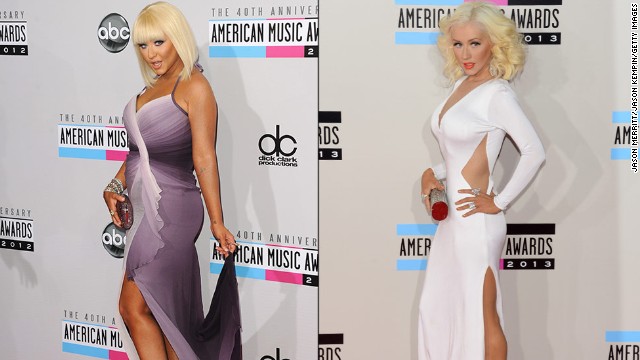 Christina Aguilera
turned heads on the American Music Awards' red carpet for two years in a
row. At the awards ceremony in 2013, Aguilera surprised onlookers by
arriving in a skin-tight white gown with revealing cutouts, displaying a
much different look than her voluptuous appearance at the 2012 event.
Christina Aguilera
turned heads on the American Music Awards' red carpet for two years in a
row. At the awards ceremony in 2013, Aguilera surprised onlookers by
arriving in a skin-tight white gown with revealing cutouts, displaying a
much different look than her voluptuous appearance at the 2012 event. 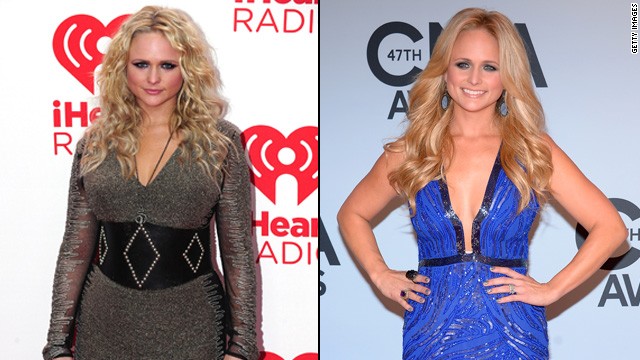 At the 2013 CMA
Awards, singer Miranda Lambert revealed a slimmer physique. Apparently,
her fit frame is courtesy of personal trainer Bill Crutchfield: "Hey
@CrutchCamp," Lambert tweeted November 7. "I got some compliments last night thanks to you!"
At the 2013 CMA
Awards, singer Miranda Lambert revealed a slimmer physique. Apparently,
her fit frame is courtesy of personal trainer Bill Crutchfield: "Hey
@CrutchCamp," Lambert tweeted November 7. "I got some compliments last night thanks to you!" 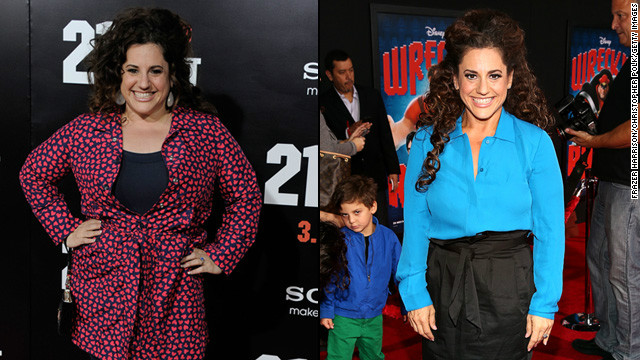 There's no way
Marissa Jaret Winokur could play "Hairspray's" zaftig Tracy Turnblad
these days. The Tony-award winning actress dropped 60 pounds in 2012.
There's no way
Marissa Jaret Winokur could play "Hairspray's" zaftig Tracy Turnblad
these days. The Tony-award winning actress dropped 60 pounds in 2012. What a 'Late Show' with Ellen would have looked like
Both Ellen DeGeneres and Stephen Colbert were
considered possible replacements for David Letterman after he announced
he's retiring from "The Late Show" next year.
With Colbert landing the job DeGeneres is officially out of the running, but thankfully, she wasn't gunning for it anyway.On Thursday's episode of her talk show "Ellen," she admits that she's happiest in daytime.
"I heard a rumor that one of the people being considered to take over 'The Late Show' is me," she tells her audience. "I am flattered, but I really love doing my daytime show. Nighttime is very different, there's a lot of political humor, which I don't do."
But since she believes that you don't know if you're good at something until you try it, DeGeneres gave her own spin on how her version of "The Late Show" would look (complete with jazzy intro music!):
If DeGeneres were to transition to late night, you could expect her monologues to include jokes about her sexuality - "thank you, ladies and gentlemen! I haven't had that much trouble coming out since 1996" - attempted jabs at what's going on in the news - "There's so much happening in politics right now ... Europe. Asia. Um, Hillary Clinton, am I right?" - and a "Top 11" list that's just a ranking of her pets.
"I'll stick to daytime for now," she says after her test run. "I would like to say to David Letterman, you are an incredibly brilliant and clever man. I've been a fan, I've loved watching you, you've made us happy for over 30 years."
And now, as Letterman prepares to step down, it's Colbert's turn.
Singer Chris Brown in Virginia jail
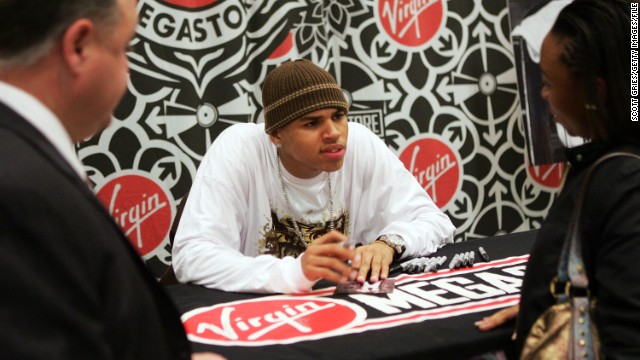 Singer Chris Brown
was being held in a Virginia jail Thursday while he awaits trial in
Washington D.C. for misdemeanor assault, the facility confirmed.
Singer Chris Brown
was being held in a Virginia jail Thursday while he awaits trial in
Washington D.C. for misdemeanor assault, the facility confirmed.
He is being held in Warsaw, Virginia.
The U.S. Marshals Service delivered Brown there on Monday after a five-day cross country trip via the Justice Department's "Con Air" -- the nickname for the federal government's Justice Prisoner and Alien Transportation System.
The trial is likely either on April 19 or 21, following the trial of his bodyguard.
Once the Washington case
is concluded, Brown is to be returned to the Los Angeles County jail the
same way he got to Washington — via Con Air.
If he is acquitted in the
trial, however, it is expected his lawyer, Mark Geragos, will attempt
to persuade the Los Angeles judge to allow him to return to California
on his own.
The singer and his
bodyguard, Christopher Hollosy, are charged with hitting a man on a
sidewalk just blocks from the White House in October.
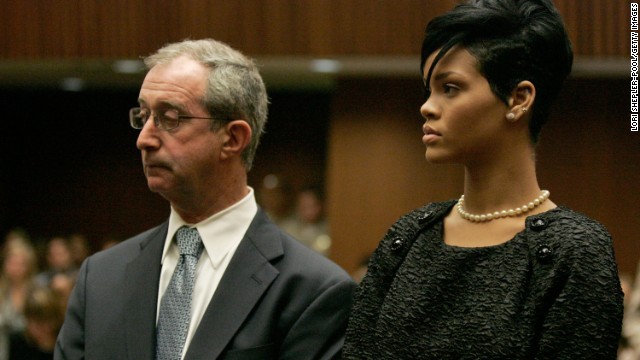 The judge asked Rihanna to appear in court to hear details of the order requiring Brown to stay 50 yards away from her -- 10 yards if the two appeared at the same industry event together. Here she appears with her attorney, Donald Etra.
The judge asked Rihanna to appear in court to hear details of the order requiring Brown to stay 50 yards away from her -- 10 yards if the two appeared at the same industry event together. Here she appears with her attorney, Donald Etra. 





